BloodNet

| a game by | Microprose |
| Platforms: | Amiga, PC (1993) |
| User Rating: | 8.7/10 - 3 votes |
| Rate this game: | |
| See also: | Quest Games, Cyberpunk Games |
The future: anonymous dark, depressing and chaotic. Teeming with overpopulated cities controlled by faceless corporations. Three year old kids selling 'smart' drugs to students with cybernetic hair extensions. Human minds transferred to a hard drive and exchanged for Leisure Suit Larry XVII savegames. People wiping their bottoms with paper-thin computers infinitely more sophisticated than your beloved pc. Thank God we don't live there, eh?
Bloodnet is the latest offering from the adventures division of MicroProse, and it's so deeply immersed in all things futuristic and 'techy', it'll make your head spin. This is no bad thing: Bloodnet is an rpg, a genre inexorably linked with the words 'Tolkien' and 'dungeon'. Now, if there's one thing I can't stand, it's dungeons. I've never understood just what it is that compels people to invest time and money in wandering around dull, computerised simulations of dungeons. If it's confined Space and stale, dank air you're after, then why not spend an evening in the toilets of your local pub? At least you'll be out of the house and meeting people, even if they do give you funny looks.
Thankfully, there isn't a dungeon to be found in Bloodnet. And there aren't any trolls either. Or elves. And as for ores - pah! Who needs 'em? Not that it's completely monster free, oh no. It has an abundance of ravenous vampires in it. And guess what? You're one of them.
Incisor dealing
The game opens in Manhattan, in the year 2094. It's not a very nice place. In short, everything's knackered. Poverty and crime are rife, so it's no surprise to learn that the majority of the population prefers to spend its time swanning about in Virtual Reality. This has led to a chronic breakdown in basic city services. To get a clearer image, try to imagine the mess you manage to create in the kitchen when trying to fix yourself a snack after a long night spent in the pub, multiplied by 10,000 and spread across a gargantuan metropolis.
Your character labours under the unlikely moniker of Ransom Stark: freelance mercenary and all-round wise guy who, because this is the future, dresses like Harrison Ford in Bladerunner. Stark's been foolish enough to get himself mixed up with a gang of vampires led by the evil Abraham Van Helsing, an arch scoundrel who plans to grasp control of the entire city and the sprawling mass of cyberspace for his own dastardly purposes. Lured to Van Helsing's flat by a glamorous young vampiress. Stark learns of this horrendous scheme and manages to escape, but not before Abraham himself has plunged his fangs into his neck and slurped up a few gob fulls of blood. Et voila: instant Christopher Lee.
Well, nearly. Fortunately for Stark (but unfortunately for me, since I'm the one who's got to try to explain the premise as concisely as possible), he has a 'neural implant' attached to his brain. This nifty little gadget was implanted several years before by his best mate, Deirdre: a computer whiz. The reason being: Stark had begun to suffer from 'Hopkins-Brie Syndrome': a condition which leaves its sufferers unable to distinguish between Virtual Reality and, well... Real Reality. Usually, the implant manages to keep Stark relatively sane, but now it's got to contend with the influence of the vampire blood coursing through his veins, urging him to bite anything vaguely neck-like. Deirdre would no doubt be able to help but, alas and alack, she's been kidnapped by Van Helsing as part of his plans for global domination. Cuh! So, all Stark has to do is to find Deirdre, rid himself of the neck-chomping bug, defeat Van Helsing, and generally make everything nice again. Piece of cake, eh?
Mouse potato
For a game so obsessed with all things futuristic and technological, Bloodnet seems curiously old-fashioned in design. The graphics, whilst suitably mean and moody, are by no means stunning, and all the sprites are disappointingly small and crudely animated - somewhat reminiscent ofPsygnosis' recent Innocent Until Caught (spit).The music is dreadful; sounding for all the world like the least talented members of Level 42 (and that's saying something) groping drunkenly at a Rolf Harris stylophone. Combat is turn-based, with success or failure determined by character skills, armour ratings and experience points. So, if you're impatient and thirsting for action you might as well sod off right now.
Using the control system is as awkward as trying to catch a well-greased saveloy between your elbows, as, for some puzzling reason MicroProse has decided to hide the game interface completely - it's accessed only by moving the pointer to the top of the screen. This means that, should you find yourself in a location with a variety of objects scattered about on the floor, none of which can be identified by a cursory glance (just you try distinguishing a phial ofVitacompound G from a flask of Primaphetamine), you have to pick each one up in turn, drag it tp the top of the screen and click on the 'Examine' option. The manual states that the game interface is displayed '...only when it is needed', but since it's needed all the bleeding time, why not simply include an option to keep it permanently on view? As it is, you end up feeling like the cyberpunk equivalent of Mr Magoo; having to pick up each and every item you come across and squint at it until you can fathom out just what the hell it's supposed to be. However, once you've come to terms with this inconvenience, you're ready to plunge headlong into the storyline. And then get utterly confused.
Hypercybertechnojargon
The next problem you'll have to contend with is your own technofear. Since Bloodnet takes place too years into the future, where computers are infinitely more sophisticated and commonplace than they are today, you'll find yourself wrestling with concepts such as cyberspace, nanotechnology, data angels, and a whole host of words which seem to consist of little more than a prefix (usually Bio-, Cyber-, Nano-, or Inter-), attached to an equally baffling suffix (either -jack, -net, -deck, or -tech), with no recognisable 'real' word in between. All the characters talk as if they've just been force-fed a copy of Wired magazine and are plugged into the mains. It's rather like the sensation I experienced one afternoon during a pure mathematics lesson at school when, having bunked off for half a term, I found myself sitting in a classroom surrounded by fellow pupils nodding solemnly as the teacher discussed concepts derived from other concepts which I'd never learnt in the first place. The result? Bewilderment, k rampant insecurity, and the worst pure maths exam paper in the history of scholastic failure.
Still, with a modicum of effort and a willingness to learn, you should be able to pick up the thread fairly early on. Once you feel confident enough to digest phrases like: 'I'll just jack into the web and check out the Flux Rider's Well - I got me a TransTech cloak chip, so the Ice shouldn't be a problem', it soon dawns on you that a lot of thought has gone into Bloodnet's little world. It's a refreshing change from the usual dunderheaded 'Mystic Sword of Kryyndaar' nonsense which forms the backbone of most rpgs. The dialogue is fresh and interesting; containing huge dollops of inessential, but nonetheless, fascinating background information, and an underlying discourse on the ethics of freedom of information, and the difficulty of retaining a sense of personal identity in a world in which biology and technology have become hopelessly entangled. Oh yes, and there's some swearing too. Hurrah!
Future schlock
Having recruited a suitable bunch of ne'er-do-wells to join your party (there's a wide selection: from ex-girlfriends to alcoholic crackshots), you can begin to explore New York and the digital dimension of Cyberspace in earnest. There are plenty of locations to choose from and hundreds of characters to talk to about hundreds of different things. Almost everyone you meet offers a new piece of information; either another location to visit or contact to meet (often in Cyberspace). Usually, they want you to perform some kind of errand for them as well. In fact, you'll often find that you've got so many things to do at once that it's impossible to remember everything. To this end, you are generously provided at the start of the game with a hand-held computer which records each and every conversation held. Thus allowing you to swot up on just exactly what it is you should be doing next. Unfortunately, since it seems to store each exchange in a random order, it's difficult to track down the correct piece of dialogue without wading through countless pages of script.
You can wander around more or less as you please, following up whichever leads you find most interesting. This might not be to everyone's taste. Those who prefer games with a linear, progressive storyline may get frustrated, whereas, anyone who enjoys being able to follow a variety of routes to success will feel completely at home. There's always something to do: from exploring the nether regions of Cyberspace, to synthesising hallucinogenic drugs from basic components with your pocket pharmaceutical kit, so it's unlikely that you'll find yourself getting bored. The answers to many problems lie in bridging the gap between reality and the internet. For instance, at one point I encountered a 'data angel' (i.e. the 'online' identity of a person using Cyberspace) imprisoned in a security snare in Virtual Reality. With his mind trapped inside the net, his body was in danger of starving to death in front of his terminal back home. I was implored to scour New York and find him before he died. (I failed.)
You also have to keep an eye on Stark's 'Vampire-o-meter': the gauge which measures his bloodlust (when it's up to max, Stark has to bite someone), and his grip on his own humanity, which decreases each time he sinks his canines into some poor victim's neck. The rate at which 'humanity' decreases is, more or less, determined by the 'niceness' of your victim; giving, say, Ethel from EastEnders a good fanging would make it drop far quicker than an all-out tooth attack on a hundred replicas of Jonathan King. Striking a balance between being a fully-fledged member of the goofy, blood-sucking, pale-face brigade and being a decent, honest human being is quite tricky. But I find this adds a pleasant dose of desperation to the entire proceedings.
Yeah? And? So? What?
Overall, I feel that Bloodnet's strengths outweigh its weaknesses, but only just. Despite all my gripes about the control system, the fairly basic graphics and the old-fashioned combat system, I found the game quite engrossing. If you're patient, enthralled by science fiction and have been waiting for a good ol' rpg which doesn't smell even faintly of Tolkien, then give it a spin. There are plenty of surprises, lots of hi-tech gizmos, sparks of genuine wit and, best of all, not a single bloody dungeon.
Download BloodNet

System requirements:
- PC compatible
- Operating systems: Windows 10/Windows 8/Windows 7/2000/Vista/WinXP

System requirements:
- PC compatible
- Operating systems: Windows 10/Windows 8/Windows 7/2000/Vista/WinXP

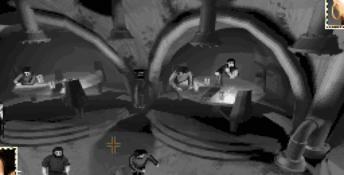

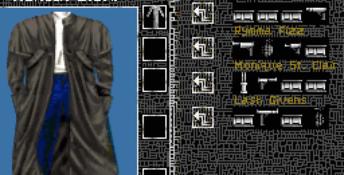

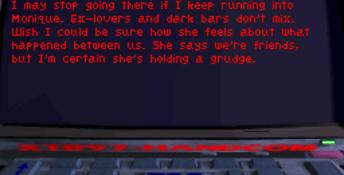
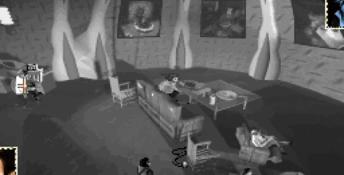
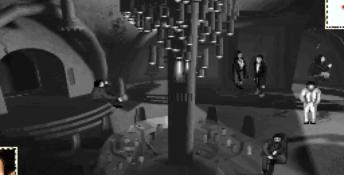
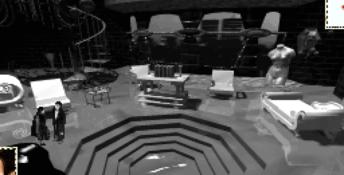


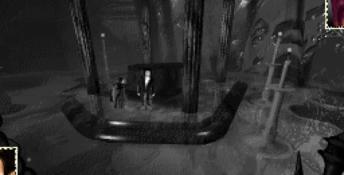
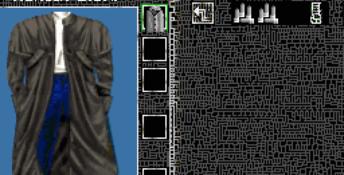
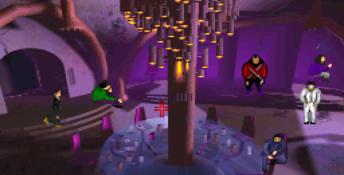
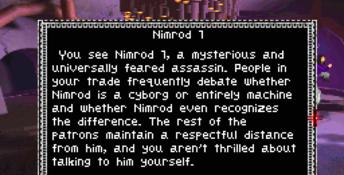
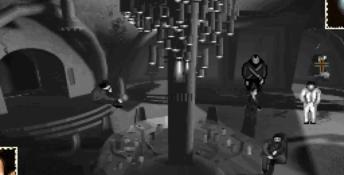
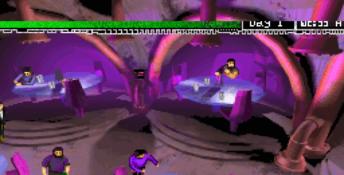
















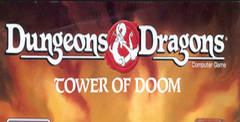 D & D Tower Of Doom
D & D Tower Of Doom
 Dark Sun: Wake of the Ravager
Dark Sun: Wake of the Ravager
 Hydlide
Hydlide Ravenloft: Strahd's Possession
Ravenloft: Strahd's Possession
 Revengers Of Vengeance
Revengers Of Vengeance Superhero League Of Hoboken
Superhero League Of Hoboken
 Swords and Serpents
Swords and Serpents Wild Arms: 2nd Ignition
Wild Arms: 2nd Ignition